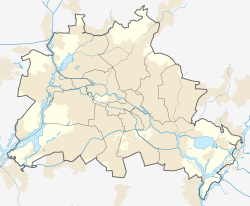Volkspark Hasenheide
| Volkspark Hasenheide | |
|---|---|
 Aerial view | |
| Type | Urban park |
| Location | Neukölln (quarter), Neukölln (borough), Berlin |
| Coordinates | 52°29′13″N 13°24′59″E / 52.48694°N 13.41639°E |
| Created | 1936-1939 |
| Status | Open year-round |
The Volkspark Hasenheide is a park of around fifty hectares in the Berlin quarter of Neukölln on the border with Kreuzberg. The name of the park goes back to the use of the area as a rabbit enclosure from 1678. The Great Elector, Frederick William hunted there.[1]
History
[edit]Long before the planning for Hasenheide as a park, there was a cemetery located there. Originating in 1798, it was the first Muslim burial place near Berlin. Turks who died in Berlin were buried there.[2]
The first Turnplatz, or open-air gymnasium, was opened here by Friederich Ludwig Jahn, in 1811 [1].[3] However, the impressive wooden exercise structures were taken down in 1819 because of political turmoil.
In 1904, Hasenheide was transferred from the then Teltow district to Rixdorf. As early as the 1920s, there were plans to turn the area, with its old trees, into a public park.[4] Construction began 1936, only after the monument to the father of the German gymnastics movement, Friederich Ludwig Jahn, was moved to a new location. By 1939, only an eastern section of the park had been completed.[5] In the same year, the city of Berlin purchased around 26 hectares of Hasenheide for 522,987 Marks.[6]
During the Second World War, there were plans to build a pair of flak towers in Hasenheide. They were meant to be the fourth pair, adding to the existing ones in the Tiergarten, Volkspark Friedrichshain and Volkspark Humboldthain. However, they were never built.
After the end of the Second World War, 700,000 m3 of rubble were used to create a hill in the western part of Hasenheide called the Rixdorfer Höhe (en: Rixdorf Height). It towers around the surrounding area, reaching a height of 68 metres (223 ft) above sea level. Until around 1950, the US Army used the area as a shooting range.[7]
The area was again planned as a park and opened as such on June 7, 1954. The shooting range was removed and the area was landscaped according to the plans of Neukölln gardening authority, Kurt Pöthig.[8]
Founded in 2009, the park now has a tree nature trail with trees of the year. Each year a new tree is added to expand the trail.[9]
Activities
[edit]

Today, the park has an open-air cinema, an animal enclosure, a mini golf course, a rose garden, several playgrounds and a dog park. In the middle of the park is a 1950s-style kiosk called Hasenschänke.[10]
According to the official city website berlin.de, some parts of the park resemble a drug bazaar.[11]
References
[edit]- ^ "Volkspark Hasenheide". Retrieved 8 March 2021.
- ^ Der vergessene Friedhof, Berliner Tageblatt, 1. August 1905,
- ^ Die Deutsch Turnkunst,Friederich Ludwig Jahn, 1816
- ^ Die Hasenheide als Volkspark. In: Vossische Zeitung, 31. Januar 1932
- ^ Gerd Steins: Wo das Turnen erfunden wurde... Friedrich Ludwig Jahn und die 175jährige Geschichte der Hasenheide, (Berliner Forum 6/86), Berlin 1986, S. 76
- ^ Erich Ritter: Ein Gang durch die Geschichte der Hasenheide, in: Neuköllner Heimatverein, Mitteilungsblatt Nr. 8 (1956), S. 46
- ^ Matthias Heisig: Flughafen Berlin-Tempelhof. Die amerikanische Geschichte. Hrsg. für das AlliiertenMuseum von Gundula Bavendamm und Florian Weiß, Berlin 2014, P. 92
- ^ Neuköllner Jahrbücher. Verwaltungsbericht 1950 bis 1954, Berlin 1954, P. 124
- ^ Staatssekretärin Schwarzelühr-Sutter würdigt den "Baum des Jahres 2014" Pressemitteilung des Bundesministeriums für Umwelt, Naturschutz, Bau und Reaktorsicherheit vom 2. April 2014
- ^ Andreas Scheffler: Keine Hasen, keine Heide, aber schön. In: Berliner Zeitung, 25. März 2003
- ^ "Volkspark Hasenheide". Retrieved 8 March 2021.


 French
French Deutsch
Deutsch